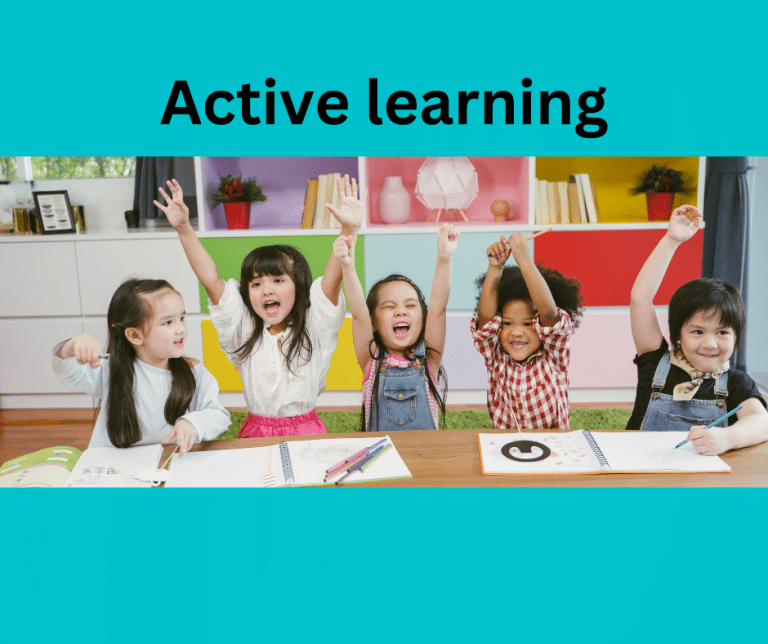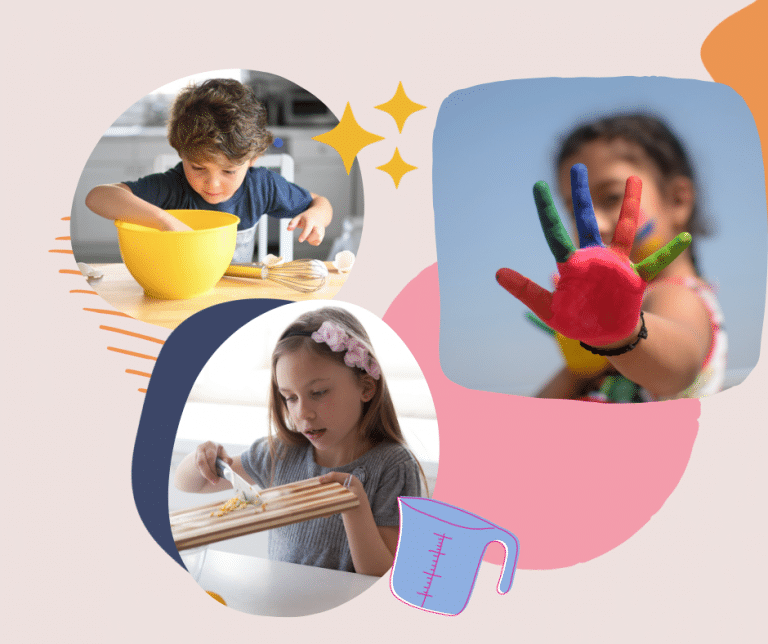What Active Learning Means for Preschoolers
What Active Learning Means for Preschoolers

Do you aspire for your child to possess the ability to concentrate on tasks without being easily diverted, exhibit boundless enthusiasm and vigour, and exhibit a keen eye for detail?
Achieving these qualities in a preschooler often requires cultivating active learning skills. However, The rewards stemming from active learning for your children render the endeavour truly worthwhile.
What is active learning and what it means for preschoolers?
Active learning is an educational philosophy that prioritizes involving students directly in the learning journey through hands-on, participatory activities and tasks.
In stark contrast to traditional passive learning methods, where students are primarily passive recipients of information presented by instructors or textbooks, active learning propels students into an active, engaged role in their education.
The foundation of this approach rests on the premise that students glean a deeper and more enduring understanding of the subject matter when they are actively engaged in activities such as exploration, discussion, problem-solving, and thoughtful reflection.
With active learning, your children will gain many benefits:
• Increased motivation and engagement: Active learning can make learning more enjoyable and meaningful, leading to higher levels of children’s motivation and participation.
• Problem-Solving: Children are presented with real-world problems or scenarios to solve by utilizing their knowledge, analyzing data, and devising solutions.
• Higher-Order Thinking: Active learning promotes higher-order cognitive skills such as critical thinking, analysis, synthesis, and evaluation, rather than just memorization of facts.
• Improved retention of information: Engaging in active learning activities helps your children remember and understand concepts better compared to passive learning.
• Enhanced communication and collaboration skills: Group activities and discussions help preschoolers develop effective communication and collaboration skills, which are valuable in various aspects of life.
• Better preparation for future learning: Active learning fosters independent learning skills that prepare your child for lifelong learning.
5 tips to encourage active learning for your preschoolers
Children always like to have fun, so to encourage children to learn actively, parents and teachers can integrate fun activities while teaching them. Following are 5 helpful tips:
1. Encourage Curiosity and Quiries:
• Nurturing a culture of curiosity involves inspiring your children to inquire about the wonders of the world surrounding them. For instance, encouraging them to ponder questions like: “Why does the sea appear blue?” or “What are rabbits’ favourite foods?” can stimulate their curiosity and ignite their thirst for knowledge.
• Furthermore, practising patience and offering considerate responses to their questions, even when you may not have all the answers, fosters an environment that nurtures critical thinking. Suggesting that your child explore additional subjects aligned with their interests is also beneficial. While dinosaurs might fascinate some children, others may have a passion for various types of cars.
2. Support Hands-On Learning:
• You can engage in hands-on activities and experiments alongside your child. Delving into science experiments, artistic projects, and constructing models together can be a delightful and educational experience.
• It is better to designate a quiet and comfortable space for studying. Parents should also ensure the availability of essential supplies, including pens, paper, books, and technology, to facilitate and enhance the learning experience.

3. Outdoor play:
• Parents can plan family outings to museums, science centres, zoos, and botanical gardens, offering valuable hands-on learning opportunities beyond the confines of the classroom.
• Encourage your children to play at the park or take leisurely nature walks to savour the fresh air. The environment offers many intuitive learning opportunities for children to explore and discover.

4. Promote Active Reading:
• Active reading is an effective technique to encourage your child’s deeper engagement with reading materials. Encourage them to summarize what they’ve read, make predictions, and engage in discussions about the text’s main ideas and themes.
• Children are naturally curious and often have many questions. Instead of offering immediate answers, it’s beneficial for parents to guide them through the problem-solving process, nurturing their critical thinking skills.
5. Be a Learning Role Model:
• Children are keen observers of their parents’ behaviour, often looking to them as role models. It’s important to regularly emphasize to your child that you, as their parent, continually explore and learn to acquire new knowledge and skills to enhance your work. Remember, you are their first teacher and source of inspiration.
• Picture this scenario: You pick up a book to read, and your child, filled with curiosity, asks, “Mom, what are you reading? Is it interesting?” In response, you say, “I’m delving into a book about cooking new dishes, and I’m finding it incredibly fascinating!” While the child may not grasp the entirety of the content you’re reading, they’ll also gain the impression that adults engage in continuous learning, which can be pretty captivating. This approach is pivotal in cultivating a child’s curiosity, piquing their interest, and fostering a genuine love for exploration and lifelong learning.
Conclusion
Ultimately, the goal is to create a nurturing and positive learning environment that fosters active engagement and instil a passion for lifelong learning in your children.
Picture a delightful day when you and your children venture to a bookstore to search for new reading materials. Their enthusiasm shines as they eagerly help select books, one after another, requesting you to purchase them. Upon returning home, they eagerly dive into their newly acquired books, reading each page and eagerly sharing the content with you. At this moment, you’ve taken a significant stride towards instilling active learning principles in your child, marking an initial triumph in your educational journey together.
Mulberry School Tour
Our Locations
Click here to visit our Contact Us page and view the preschool/infant care centres conveniently located near you.
CONNECT WITH US
USEFUL LINKS
About Us
Mulberry Learning prides itself on making the preschool experience both memorable and enjoyable while transforming a child into a competent explorer, an imaginative thinker, and a creative problem solver. Through our proprietary award-winning curriculum, unique Habits of Mind programme and dedicated staff who are passionate about imparting positive attitudes, Mulberry Learning holds strong in its promise to deliver a holistic education that nurtures the Future Ready Child.
A PREMIUM PRESCHOOL BRAND UNDER GLOBAL EDUHUB


